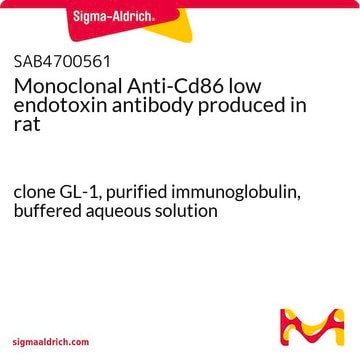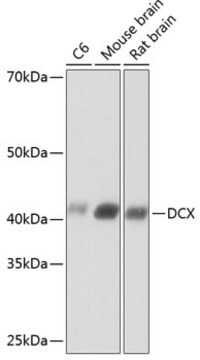SAB4200508
Anti-ARG1 antibody, Mouse monoclonal
clone ARG1-3, purified from hybridoma cell culture
Synonyme(s) :
Anti-arginase-1, Anti-liver-type arginase, Anti-type I arginase, Monoclonal Anti-ARG1 antibody produced in mouse
About This Item
Produits recommandés
Source biologique
mouse
Niveau de qualité
Conjugué
unconjugated
Forme d'anticorps
purified from hybridoma cell culture
Type de produit anticorps
primary antibodies
Clone
ARG1-3, monoclonal
Forme
buffered aqueous solution
Poids mol.
antigen ~40 kDa
Espèces réactives
rat, human, mouse
Concentration
~1.0 mg/mL
Technique(s)
western blot: 2-4 μg/mL using whole extracts of rat or mouse liver.
Numéro d'accès UniProt
Conditions d'expédition
dry ice
Température de stockage
−20°C
Modification post-traductionnelle de la cible
unmodified
Informations sur le gène
human ... ARG1(383)
Description générale
Immunogène
Application
Actions biochimiques/physiologiques
Forme physique
Clause de non-responsabilité
Vous ne trouvez pas le bon produit ?
Essayez notre Outil de sélection de produits.
En option
Code de la classe de stockage
12 - Non Combustible Liquids
Classe de danger pour l'eau (WGK)
WGK 1
Point d'éclair (°F)
Not applicable
Point d'éclair (°C)
Not applicable
Faites votre choix parmi les versions les plus récentes :
Certificats d'analyse (COA)
Vous ne trouvez pas la bonne version ?
Si vous avez besoin d'une version particulière, vous pouvez rechercher un certificat spécifique par le numéro de lot.
Déjà en possession de ce produit ?
Retrouvez la documentation relative aux produits que vous avez récemment achetés dans la Bibliothèque de documents.
Notre équipe de scientifiques dispose d'une expérience dans tous les secteurs de la recherche, notamment en sciences de la vie, science des matériaux, synthèse chimique, chromatographie, analyse et dans de nombreux autres domaines..
Contacter notre Service technique








